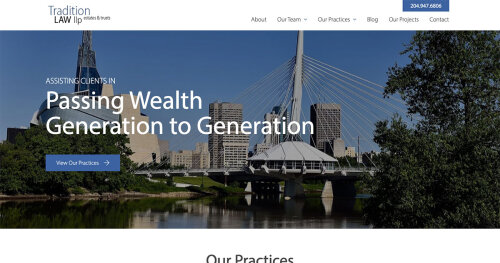Best Nonprofit & Charitable Organizations Lawyers in Winnipeg
Share your needs with us, get contacted by law firms.
Free. Takes 2 min.
List of the best lawyers in Winnipeg, Canada
About Nonprofit & Charitable Organizations Law in Winnipeg, Canada
Nonprofit and charitable organizations in Winnipeg operate within a framework governed by both federal and provincial laws. These organizations play a crucial role in serving community needs and advancing various causes, from arts and culture to social services and education. In Winnipeg, nonprofits must comply with the Canada Not-for-Profit Corporations Act and the Manitoba Corporations Act if they operate within the province. Charitable organizations, in particular, must adhere to the legal requirements to maintain their charitable status under the Income Tax Act of Canada, which allows them to issue tax receipts for donations and apply for grants.
Why You May Need a Lawyer
Starting and maintaining a nonprofit or charitable organization involves several legal considerations. Here are some common situations where legal assistance may be beneficial:
- Incorporating as a nonprofit or registering as a charity.
- Drafting and reviewing bylaws and governance documents.
- Navigating tax obligations and maintaining tax-exempt status.
- Handling employment and volunteer agreements.
- Compliance with fundraising laws and regulations.
- Anticipating and resolving disputes among board members or with external parties.
- Adapting to changes in legislation affecting the nonprofit sector.
Local Laws Overview
Some key local legal aspects relevant to nonprofit and charitable organizations in Winnipeg include:
- Incorporation and Bylaws: Organizations must establish clear bylaws in accordance with the Manitoba Corporations Act to define their operational procedures, member responsibilities, and governance structure.
- Charitable Status: To obtain charitable status, organizations must apply to the Canada Revenue Agency (CRA) and demonstrate their purpose aligns with charitable objectives.
- Tax Compliance: Nonprofits in Winnipeg must comply with federal tax filing requirements and may be eligible for GST/HST rebates if they are registered charities.
- Fundraising and Compliance: Organizations must adhere to the rules set by both provincial and federal law in terms of how they solicit donations and manage their finances.
Frequently Asked Questions
How do I start a nonprofit organization in Winnipeg?
To start a nonprofit in Winnipeg, you'll need to: define your mission and objectives, choose an appropriate name, prepare incorporation documents, draft bylaws, and apply for incorporation through the Manitoba Companies Office. Consider consulting a lawyer to help navigate this process.
What is the difference between a nonprofit and a charity?
While all charities are nonprofits, not all nonprofits qualify as charities. Charities must have purposes that fall within certain categories recognized by CRA (such as relief of poverty), and they can issue tax receipts for donations which nonprofits cannot.
What are the benefits of obtaining charitable status?
Charitable status enables an organization to issue tax-deductible receipts to donors, apply for additional funding from government and private grants, and benefit from certain tax exemptions.
Are there specific reporting requirements for charities in Winnipeg?
Charities must file annual information returns with CRA, detailing their financial activities and confirming their adherence to their charitable purposes. They must also keep accurate records of donations and expenditures.
Can a nonprofit organization in Winnipeg make a profit?
Nonprofits can generate surplus revenue, but this must be reinvested in the organization's mission rather than distributed to members or officers.
What are the governance requirements for nonprofits in Winnipeg?
Nonprofits must have a board of directors responsible for overseeing the organization's activities, ensuring financial accountability, and complying with legal obligations.
What laws apply to fundraising activities for nonprofits?
In Manitoba, fundraising laws require transparency and accountability, ensuring funds raised are used for the purpose intended. Additional CRA regulations apply for charitable organizations.
How are conflicts within the board of a nonprofit typically resolved?
Disputes are usually resolved through mediation or arbitration, with recourse to the courts as a last resort. It's important to have clear dispute resolution mechanisms in governance documents.
Can a foreign entity establish a nonprofit in Winnipeg?
Foreign entities can establish a nonprofit but must comply with Canadian incorporation regulations and, if applicable, obtain approval for charitable registration.
What insurance is recommended for nonprofits in Winnipeg?
Nonprofits should consider liability insurance, volunteer insurance, and directors and officers insurance to protect against potential legal claims and liabilities.
Additional Resources
For further assistance, consider consulting the following organizations:
- Canada Revenue Agency (CRA): Offers guidance on charitable registration and compliance.
- Volunteer Manitoba: Provides resources and training for nonprofits seeking to engage volunteers.
- Manitoba Companies Office: Assists with incorporation filings and organization maintenance.
- Imagine Canada: Supports charities and nonprofits in Canada by providing resources and advocacy.
Next Steps
If you require legal assistance, consider reaching out to a lawyer specializing in nonprofit and charitable law. They can provide tailored advice and services to ensure compliance with legal obligations and support your organization's specific needs. Begin by researching legal firms in Winnipeg with expertise in this area and schedule a consultation to discuss your requirements and any specific concerns you may have.
Lawzana helps you find the best lawyers and law firms in Winnipeg through a curated and pre-screened list of qualified legal professionals. Our platform offers rankings and detailed profiles of attorneys and law firms, allowing you to compare based on practice areas, including Nonprofit & Charitable Organizations, experience, and client feedback.
Each profile includes a description of the firm's areas of practice, client reviews, team members and partners, year of establishment, spoken languages, office locations, contact information, social media presence, and any published articles or resources. Most firms on our platform speak English and are experienced in both local and international legal matters.
Get a quote from top-rated law firms in Winnipeg, Canada — quickly, securely, and without unnecessary hassle.
Disclaimer:
The information provided on this page is for general informational purposes only and does not constitute legal advice. While we strive to ensure the accuracy and relevance of the content, legal information may change over time, and interpretations of the law can vary. You should always consult with a qualified legal professional for advice specific to your situation.
We disclaim all liability for actions taken or not taken based on the content of this page. If you believe any information is incorrect or outdated, please contact us, and we will review and update it where appropriate.












